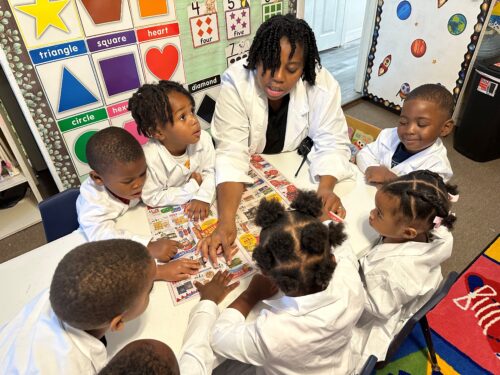
Early childhood education lays the foundation for lifelong success by promoting social, emotional, and cognitive development during a child’s most formative years. Collaborative for Children believes in building vibrant communities where every child has the chance to dream big and realize their potential. High-quality early childhood education supports this mission by instilling confidence, curiosity, and resilience through hands-on learning and nurturing relationships.
An early childhood educator plays a pivotal role as they guide children through their first steps toward a lifetime of learning. Early childhood education offers a structured learning environment, building upon the foundation established at home by parents and caregivers. This education is important because early learning experiences directly impact brain development, forming neural pathways. These experiences significantly impact children’s future learning and overall well-being.
Here are the top qualities of an effective early childhood teacher that promote growth and support each child’s development:
An understanding of child development is fundamental to every childhood educator. But great teachers go beyond theory. They foster a positive and encouraging environment. This approach is especially beneficial when dealing with special education or other developmental differences.
They provide guidance, model social skills, and carefully observe each child’s cues. Skilled teachers work with families to support students’ growth and development. This creates a collaborative effort, leading to improved learning outcomes. It also prepares young learners for the future.
At Collaborative for Children, we emphasize the value of early childhood education teachers who are committed to guiding children through these early stages. With the right foundation of support, guidance, and nurturing, children are prepared to enter preschool, and eventually Kindergarten school ready to learn, dream, and excel. Investing in early education is an investment in a brighter future for our communities, one where each child has the opportunity to flourish.
An early childhood educator is a trained professional. They specialize in the education and care of young children, usually from birth to age eight. They work in various settings, including preschools, daycare centers, and early learning programs.
Degree requirements vary by state and institution. Common degrees include an Associate’s degree in Early Childhood Education (ECE), a Bachelor’s degree in ECE or Child Development, and a Master’s in Early Childhood Education. Certification requirements also differ by location.
A professional early childhood educator goes beyond teaching basic skills to develop individualized learning plans, monitor progress, and communicate with families. They design a curriculum that promotes growth in all developmental areas—physical, social-emotional, cognitive, and language.
Professional ECE teachers regularly assess their students’ progress. They create engaging learning activities and closely observe children’s responses. Teachers work with students individually or in small groups based on their strengths and needs. They often discuss these observations with families to provide insights and track progress.
Assessments guide the next steps in a child’s learning journey. They may help determine appropriate placement in specific programs like Head Start. Professional development for teachers helps ensure they are knowledgeable and capable of implementing appropriate education programs.
Who We Are